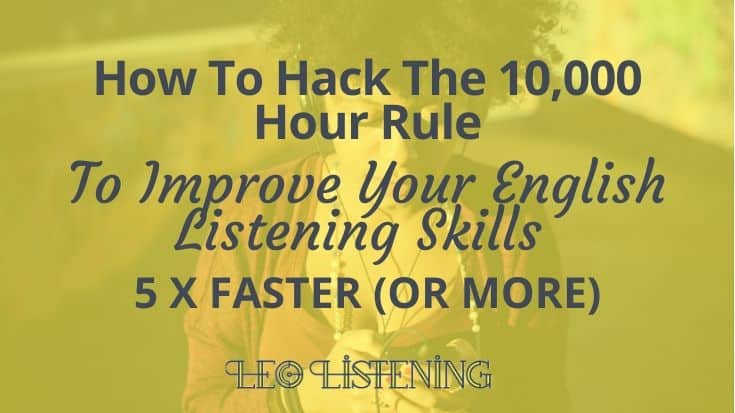Have you heard of the 10,000 hour rule?
It was popularized by the author Malcom Gladwell in the 2008 book Outliers – The Story of Success.
He reported on a study by Anders Ericsson, to explain what separates top performers in certain fields from the rest. And it seems that what’s required is 10,000 hours of what’s called “deliberate practice”.
So if you do 20 hours a week of this practice (playing the violin, computer programming, whatever it is), for 50 weeks a year (so you get 2 weeks of holiday!) then ten years later, you’ll have mastered the skill.
By that logic, if you manage to do 3-5 hours a day of listening (depending on whether or not you want weekends off), in 10 years, you’ll have perfect English listening skills. I interpret this as passive listening, in other words, you just listen to a podcast, or a movie or whatever and immerse yourself in it.
On some level, that might sound do-able – Cool! I’ll just watch a movie every night and then supplement it with a podcast during the day on my commute to work. But 3-5 hours a day is huge! Especially if you’re trying to fit in full-time work, study, child-rearing etc around that.
Maybe that would have been ok back when you were a teenager and had more free time. As proven by all the people who learned English with the series Friends in their bedroom by watching it religiously for ten years.
But, I hate to break it to you – you’re not a teenager any more. And do you really want to wait ten years to catch what native English speakers are saying to you when they talk fast? Also, do you even need to reach a perfect, exceptional level in your English listening?
I don’t think you really need 10,000 hours to master English listening skills. Especially if you go beyond just listening and into detailed listening.
In fact, in my listening philosophy, the shorter, the better. I love creating and working with dictations. I also love using movie and TV clips.
They’re much more manageable. And if you use them the right way, you can get plenty of bang for your buck. That’s right, you can achieve better results faster while doing less, but working a bit more intensively.

Watch the video:
Hacking The 10,000 Hour Rule With The 80/20 Rule
I’m also a big fan of the 80/20 rule which explains that 80% of your results come from 20% of your effort. So the key is to do the 20% that really matters to get the 80% results. To get the last 20% you’d have to use 80% of your effort and it’s just not worth it.
Another way to look at it is that 80% is good enough. If you understand 80% of what you hear then that’s enough to know what’s going on. So if you can catch 80% of a TV series or movie or whatever it is, then you can survive without the subtitles.
You’ll catch the rest of what you need using the non-verbal communication, like gestures, facial expressions, lip movements. Actually paying attention to the scenery and decor rather than reading the subtitles will also help.
See, we’re already starting to hack the 10,000 hour rule with the 80/20 principle.
So what’s the 20% I recommend that you focus on to get 80% of the results? That’s what we want here – a smaller, more focused effort that leads to a much greater result. The 10,000 hour rule assumes quite a linear progression. You put 1 hour in, you get 1 hour out. But what if you could be faster and better?
And in fact, you can even drill down into the 80/20 rule to get more focused and apply it to itself. I’m not very good at maths so I had to look this up. So 20% of your 20% is 4% and that 4% generates 64% of your results. So that’s just 1.5 hours in a 40 hour standard work week. Or in our example of 20 hours of deliberate practice, 45 minutes.
Well, here’s the 20% you should concentrate on if you want to see faster results. I mean wouldn’t it be great to see results after 2000 hours rather than 10,000? Or even faster if you drill down to the essential 4%.
The Essential 20% To Focus On To Understand Fast Spoken English…Faster!
Well here’s what you could do with a shorter weekly time period that’s much more focused, say 2 hours a week (or less) rather than 2 hours a day (or more):
- Focus on catching the words you already know by learning how they sound in fast speech and training yourself to catch them – the words you already know change the most in fast speech. That said, any word can change in fast speech and sound different from its citation form, in other words the careful pronunciation you’ll see in a dictionary. You can raise your awareness of how the most common words change in fast speech by using a website like Tubequizard where you can do listening quizzes on common connected speech features.
- Forget passive listening and change to active listening strategies instead and work on short sections. Although it can be tempting to just put on a movie and watch it with subtitles after a hard day at work, you’ll get faster and better results if you work on training your listening by doing dictations, listening for chunks on double speed and checking your work with the subtitles or transcript.
- Ditch monologues for dialogues and slow resources for faster ones. While it can be tempting to listen to slow material because you understand it and it makes you feel good, if you’re going to progress then you need to get out of your comfort zone. And in fact, listening to things that are hard, or even harder than what you might experience in real life is great training. That’s why movie dialogue, which can be the trickiest type of English to understand is great training for real life conversation. It’s often harder. But if you train with hard material, you’re prepared for any situation.
So, focus on these areas, train your listening more intensively rather than just passively listening and watch your skills improve faster than you ever could have imagined.

Thank you for sharing the rule.
You’re welcome – but the important thing to remember is that you don’t need 10,000 hours to achieve your goal if you use the advice in the post!